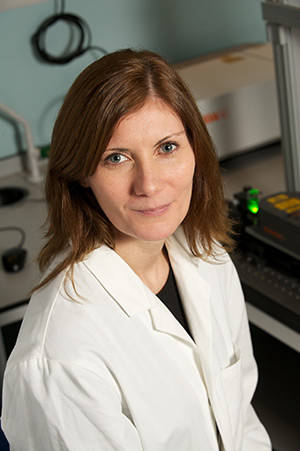Interview by Cicely Rathmell

As the University of Strathclyde prepares to host the first-ever Spring SciX in Europe next week, I had the pleasure of sitting down with Duncan Graham and Karen Faulds, leaders of the local organizing committee for this inaugural event. I wanted to find out what inspired their unique take on this spinoff of the annual SciX meeting, and what they hoped people would take away from this event.
There’s never been a “SciX” meeting in Europe, despite the presence of many member organizations of FACSS. How did the idea for Spring SciX come about initially?
We’ve been involved with SciX and FACSS for many years, and have always enjoyed going to these annual events. Over time, you just start to get involved and want to give back. One thing Duncan noticed a while back was that in the statistics of attendees, the student/postdoc attendance seemed lower at SciX versus other meetings. Through conversations with Ian Lewis and many others over several years, we started thinking about holding a SciX-like event that early career researchers particularly in Europe could attend more easily. Many people contributed to the idea, but it was the strong endorsement of the governing board of FACSS that allowed the event to become a reality.

How many attendees are you expecting to descend upon the Technology & Innovation Center next week?
We just did the final count, and we’ve got about 200 attendees from Europe, the UK, South Korea, the US, and all over. Of those, about half were eligible for early career bursaries, which we loosely defined as being in a PhD program, or within 5 years of graduation. It was important to us to include industry as well as academia, since SciX has always had a strong industrial involvement.
Can we expect Spring SciX to become a regular event, at University of Strathclyde or elsewhere?
That’s hard to say – we like to hope that this is the first of what could be an event held every 2-3 years, anywhere in Europe. FACSS has 14 member societies, and we’d love to see another division get inspired by our event to host Spring SciX next.
You’ve had the advantage of reading many of the abstracts submitted for the conference. What are some of the “not to be missed” sessions and talks?
Well, to be honest, we tried to select really good session chairs who are strong in their own analytical techniques, and then let them decide the speakers. You can see the full lineup of sessions and posters in the conference booklet. We’re really interested in seeing the talks from new students. For many it will be the first time they’ve given a talk, so when you mix that with the more established attendees, we’ve got speakers with a wide range of levels of seniority.
The opening plenary lecture is being given by Professor Chris Elliott from the University of Belfast, who is an expert in food safety – he led the UK government’s independent review of food systems after the 2013 horsemeat scandal. He’s a great speaker, and his talk will really set the tone for the conference. Our second plenary is by Gail McConnell, a professor of physics at the University of Strathclyde. It’s on how to make and use an optical microscope based on the Mesolens objective developed in her lab for medical imaging of large 3D volumes.

We’ve also got two sessions focused on early career research. The first, on Analytical Science chaired by Lizzie Griffin, starts off the talks on Tuesday afternoon, and then Karen hosts a session of the Infrared Raman Discussion Group (IRDG) on Wednesday morning. The best speaker from that session will give an invited talk at the IRDG Christmas meeting, so it’s a great opportunity for a young researcher. The session on Process Analytical led by Alison Nordon on Thursday morning keeps the connection to industry.
I know science education is an important focus for you both given your involvement with OPTIMA, the EPSRC and MRC Centre for Doctoral Training in Optical Medical Imaging. Is the early career research focus of Spring SciX an extension of that?
That’s an interesting point – we hadn’t thought of it that way. A number of the FACSS member society meetings have portions that are aimed at early career researchers, but with Spring SciX, there’s an opportunity to bring more people together over a longer period of time in one event to discuss science and connect early on in their careers.
What we’re also doing for this conference is trying to tap into an earlier stage. In fact, we’ve got 225 Glasgow high school students coming in for Chris Elliott’s plenary talk, some as young as 14 or 15 years old. He says he’s going to make the talk interactive, so both those aspects together should be quite interesting!
By bringing students in, we’re hoping to stimulate an interest in chemistry and physics early and open their eyes to the power of analytical science. Both plenaries are good subjects to highlight the multidisciplinarity of science and how technology crosses over between fields; these are the kind of things that are hard to put into the school curriculum when you’re trying to teach basic principles.
At the end of the week, what are you hoping the attendees will take away from the event?
That they enjoy themselves! You don’t want to go to a conference and not enjoy yourself. Really, we want to see everyone come away with a positive experience from the science and networking side of things. We want to make sure that people talk, and that early career researchers can make connections that extend throughout their career. With the smaller venue, we’re hoping Spring SciX is one opportunity that allows that to happen.
Thanks very much to Duncan & Karen for their time, and to the entire organizing committee and SciX Advisory Board who have helped put together the inaugural Spring SciX conference. We can’t wait to see you there!
About Spring SciX
Spring SciX 2018 will take place at the Technology and Innovation Centre at the University of Strathclyde in Glasgow, Scotland April 17-20, 2018.
Spring SciX is a UK-based meeting of the successful SciX series, covering a wide range of analytical chemistry research, with a focus on early career researchers. Join leaders in the analytical sciences as they present progress on emergent topics, meet with exhibitors, and networks over four days in Glasgow.
Spring SciX will highlight progress on emergent research topics related to analytical chemistry, including molecular spectroscopy, Raman Spectroscopy, mass spectrometry, infrared (IR) spectroscopy, surface plasmon resonance (SPR), process analytical chemistry, fluorescence, bioanalytical and biomedical, and analytical sciences. In addition, Spring SciX aims to provide Early Career Researchers an opportunity to share their work and present their vision for the future of the field.
SciX is the annual meeting of FACSS, the Federation of Analytical Chemistry and Spectroscopy Societies.
April 11, 2018


